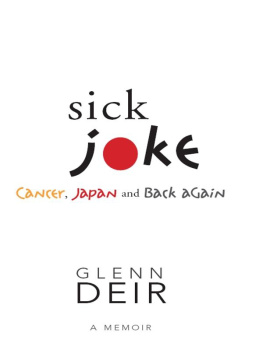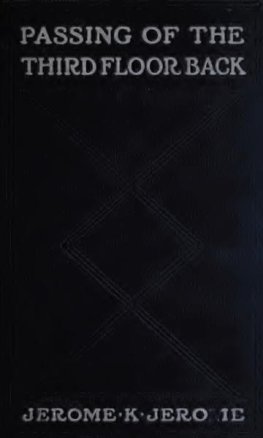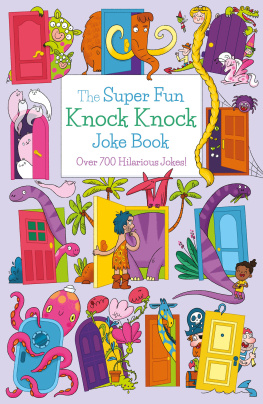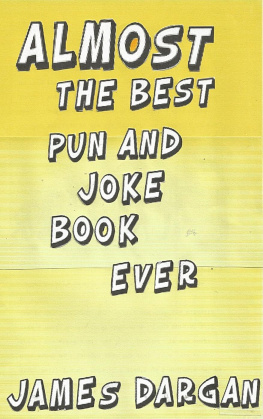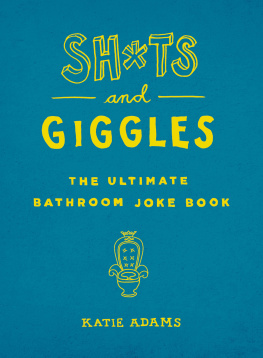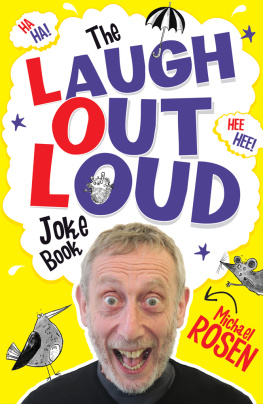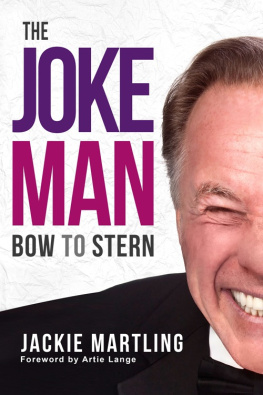
Writer and broadcaster Glenn Deir takes us on a personal health journey that begins as many often do with the discovery of a lump. Writing with brutal, laser-like honesty and rare humour, Deir takes us from Japan to Newfoundland to the famed Princess Margaret Hospital in Toronto, to that dark place where were forced to contemplate our mortality. And to that place where we surrender control of our bodies and make that leap of faith to trust our healers. This is medicine, from Deirs side of the gurney. If youve ever entertained a doubt that your doctors actually know what theyre doing, this is the book for you.
Dr. Brian Goldman, host of CBCs
White Coat/Black Art and author of The Night Shift.
sick
joke
Cancer, Japan and Back Again
A Memoir
GLENN
DEIR


LIBRARY AND ARCHIVES CANADA CATALOGUING IN PUBLICATION
Deir, Glenn, 1958
Sick joke : cancer, Japan and back again / Glenn Deir.
ISBN 978-1-55081-332-6
1. Deir, Glenn, 1958-. 2. Tonsils--Cancer--Patients--Canada-
Biography. 3. Cancer--Humor. 4. Japan--Biography. 5. Japan-
Humor. I. Title.
RC280.T7D44 2010 616.994320092 C2010-905945-X
2010 Glenn Deir
Cover Design: Rhonda Molloy
Layout: Alison Carr
ALL RIGHTS RESERVED. No part of this publication may be reproduced, stored in a retrieval system or transmitted, in any form or by any means, without the prior written consent of the publisher or a licence from The Canadian Copyright Licensing Agency (Access Copyright). For an Access Copyright licence, visit www.accesscopyright.ca or call toll free to 1-800-893-5777.
We acknowledge the support of the Canada Council for the Arts which last year invested $1.3 million in the arts in Newfoundland. We acknowledge the financial support of the Government of Canada through the Canada Book Fund for our publishing activities. We acknowledge the financial support of the Government of Newfoundland and Labrador through the department of Tourism, Culture and Recreation for our publishing activities.
PRINTED IN CANADA

For Deb
What doesnt kill you gives you a good story.
Content
One evening, while I was writing this book, my wife poked her head into the office and issued a stern warning.
Id better not be in there.
I have a confession to make. She is in here, quite a bit actually, despite her admonition. I raise the matter because shes far more private than I am and not entirely comfortable with all that Ive written. But I couldnt tell the stories without transgressing on her privacy. For that, I owe her an apology. For her support, I owe her my gratitude.
Are we still married? I asked after she had read the finished manuscript.
For now, she curtly replied.
I took that as a ringing endorsement and skulked away to find a publisher. Fortunately, Breakwater Books seems to have had no qualms about putting our lives on public display.
This is a book of memories. As a television reporter, Im reminded daily of the flaws of memory. What I think is on videotape isnt there sometimes. Events and comments didnt happen exactly the way I remember them. The stories in this memoir are based on notes made shortly after the events described. Others in the book may remember the same events quite differently. Their version is equally valid.
Three of my doctors, Dr. Boyd Lee, Dr. Alia Norman and Dr. John Waldron, kindly reviewed the book for medical mistakes; perhaps because theyre decent people and they didnt want me to get it wrong, and perhaps to see whether they should sic their lawyers on me. No lawyer has called yet.
The book is medically accurate, but only for me. Dont take it as medical gospel. Im not a doctor; Ive only interviewed one on TV.
Half this book is about cancer, my cancer the wonderfully peculiar tonsil cancer. The other half is about Japan, my Japan the wonderfully exotic Japan. Its a tale of two journeys. Along the way, I found plenty to laugh at.
It began with the long gentle stroke of a razor in a far off land.
Kole wa nan desu ka? I said to myself.
In my stubborn effort to master conversational Japanese, I practiced whenever a situation allowed me to pluck a stock phrase from my limited repertoire. And if that meant impressing an audience of just one namely me so be it. Translation: What is that?
Actually, what I wanted to say in Japanese was What the hell is that? Unfortunately, I didnt know the phrase.
My Japanese teachers, being Japanese, were always polite. I had learned only courteous Japanese. The word hell was not part of my vocabulary. In fact, no swear word was part of my vocabulary. I wasnt even sure the Japanese had obscenities. I was Glenn the Mannerly Gaijin, the foreigner who couldnt utter a Japanese profanity even when he wanted to.
I laid the razor on the sink and ran my index finger down the left side of my neck. Caress after caress. Was I imagining it, or was there really something there? A lump? When I washed away the shaving foam I thought I could see it. Just a wee bulge. The more I stared in the mirror, the more convinced I was that it was real. There was a bump on my neck. Whatever it was, it felt deep. It seemed as though I could push it around slightly. It was the size of a pea.
Decision number one: say nothing to Deb. Deb Youden, the woman who had been kicking me underneath the table for almost twenty-six years in a futile effort to save me from myself.
I met Deb in Dildo. Snicker if you must, but there is such a town in Trinity Bay, Newfoundland. Not surprisingly, the road sign outside of town is its most famous attraction. Deb was the home economics teacher at the local high school. I was an ambitious, self-absorbed, and occasionally insensitive television reporter. The kind of attributes that have encouraged friends and family to add the adjective long-suffering to the phrase Glenns wife.
Deb was dozing in the bedroom of our Tokyo apartment. Why worry her unnecessarily? This lump might disappear in a day or two. Besides, the word lump would mean only one thing to her. Cancer!
Only four months earlier, Debs younger sister had been diagnosed with non-Hodgkins lymphoma, which is cancer of the immune system. Lindas cancer was well advanced and she was in a fight for her life. Her only hope was chemotherapy treatment.
Linda had several symptoms before the diagnosis: night sweats, chronic fatigue, abdominal pain, but what really tipped her off were the lumps that she felt around her groin, under her arms and on her neck. The lumps were swollen lymph nodes. A lump in my neck and Deb would surely jump to the conclusion that I had lymphoma too.
Truth was, the thought had crossed my mind even before I left the bathroom. Because of Lindas struggle I would not dismiss this lump. I would watch it. I would be very Japanese in my approach. Precise observation of the kind that allowed the Japanese to say without doubt that the subway platform was forty-two metres away, not forty-one or forty-three. You could be sure that someone had measured the distance to within a millimetre. The smallest change in my lump would not escape my attention. If the damn thing were growing, Id pounce.
Next page
